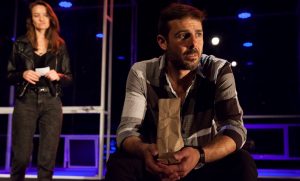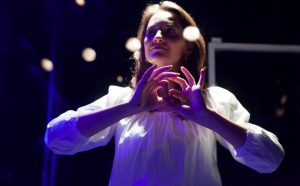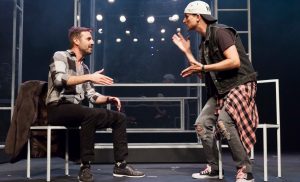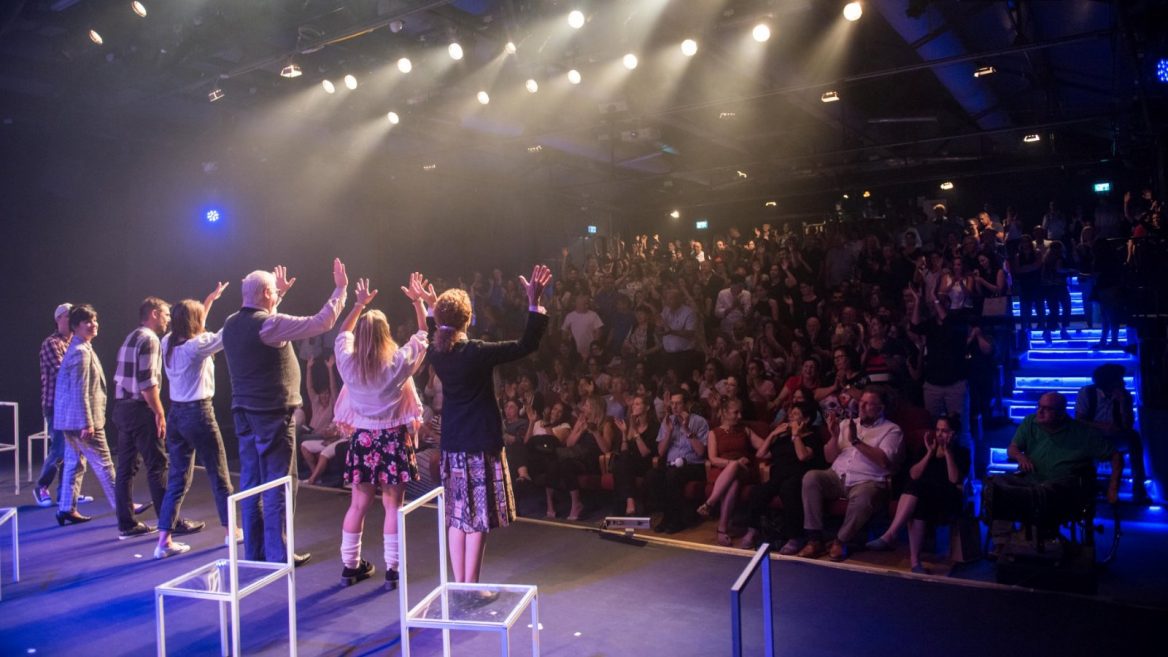By Rachel Neiman
AUGUST 7, 2018, 9:14 AM
Israel21c
The Broadway hit is now on at Nalaga’at, a unique center that aims to foster communication between sighted and blind, hearing and deaf worlds.
The 2018 Broadway revival of Mark Medoff’s 1979 Tony Award-winning drama Children of a Lesser God ended its run last May. Luckily for those in Israel, an adaptation of the play is enjoying a run in Jaffa at Nalaga’at, a unique theater ensemble composed of deaf and blind actors.
Children of a Lesser God is the story of James Leeds, a young speech therapist newly employed at a state school for the deaf; and Sarah Norman, a profoundly deaf former student now working as the school janitor.
While other students learn to lip read and use their voices, Sarah insists that anyone wishing to communicate with her must do so in sign language. The tension between James and Sarah turns to passion; they fall in love and marry but ultimately each is unable to accept the other’s way of communicating.

The play was and is still significant for having deaf performers in a play geared to the non-deaf. The hearing audience is served both by subtitles projected above the spare, modular stage set, and by James interpreting for Sarah and other signers.
Photo: In “Children of a Lesser God” at the Nalaga’at Theater in Jaffa, James (Nadav Nir) and Sarah (Heike Kiss) are unable to accept the other’s way of communicating. Photo by Avi Levi
Children of a Lesser God of the 1980s was notable for its depiction of deaf culture, its use of sign language and the newly emergent topics of female empowerment, equal opportunity and the integration of diverse groups into mainstream society.
Today’s Nalaga’at production, presented in spoken Hebrew and Israeli Sign Language (ISL), also deals with these themes but with 40 years’ worth of distance, during which time much has changed.
A force for change
Forty years ago, Children of a Lesser God could not have been presented in a venue like Nalaga’at because none existed.
The play portrays a world divided by cultures into hearing and non-hearing. Nalaga’at, whose name in Hebrew means “Please Touch,” aims at fostering understanding by bringing them together in a unique, nonprofit center of culture and arts that serves as a meeting place for deaf, blind, deaf-blind and the general public.
Located in the refurbished Old Jaffa Port, the center also includes two experiential restaurants: Kapish, staffed by deaf and hearing-impaired waiters; and BlackOut, where blind and vision-impaired waiters accompany the guests to a meal in total darkness. Since opening in 2007, Nalaga’at has hosted some 800,000 visitors.
Before presenting Children of a Lesser God, hearing-impaired Nalaga’at staff members teach the audience a few key phrases in sign language to help in understanding the play. When cast members take their bows at the end, the audience waves instead of claps so that the actors can see and receive their praise.

Photo: In “Children of a Lesser God” at the Nalaga’at Theater, Sarah (Heike Kiss) expresses herself in Israeli Sign Language. Photo by Avi Levi
The school for the deaf portrayed in Children of a Lesser God was typical of the kind that existed in the West from the 19th century through the 1980s (in the 1990s, both the United States and Israel passed laws assuring equal rights for people with disabilities). These schools were run by hearing persons, many of whom did not know sign language and insisted that lip-reading and speech therapy was the only way to give the deaf a chance to integrate into hearing society.
Children of a Lesser God also addressed the culture war within the deaf community between “oralists” who oppose sign language and advocate skills such as lip reading and speech therapy, and “manualists” who champion signing but are split between those who sign in conceptual/pictorial form (like Sarah) and those who spell word-by-word.
Life imitates art
At Nalaga’at, art imitates life as the ensemble comprises deaf actors. But life also imitates art as the issues raised by Children of a Lesser God play out in daily life.
Actor El-ad Cohen — who plays Orin Dennis, a student teacher at the school who convinces Sarah to join him in filing a complaint alleging discriminatory hiring practices — is a married gay man with two children.
Cohen says while he has never experienced discrimination for being gay, he has faced plenty as a deaf person.
“The issues [raised by the play] are still relevant because Israel still practices the oral method, not sign language,” Cohen tells ISRAEL21c. “There is an attempt to turn members of the deaf and hearing-impaired community into ‘hearing’ and eliminate the ‘disease’ of deafness with solutions like cochlear implants, which are not really a solution but an aid that can be effective when used together with sign language.”

Photo: Israeli deaf actor El-ad Cohen, right, in “Children of a Lesser God” with Nadav Nir. Photo by Avi Levi
As a speaker of ISL, I definitely identify with the play,” Cohen states. “We face a never-ending battle to make [the hearing] understand that they can’t understand our culture without first understanding our language – it is important and necessary.”
According to the Institute for the Advancement of Deaf Persons in Israel, ISL “has a rich lexicon of sign vocabulary and a complex grammatical structure … and serves as the main mode of communication for most deaf people in Israel, including Jewish, Muslim and Christian Arabs, Druze, and Bedouins. In addition to ISL, there is also Hebrew manually coded language used as a tool to teaching deaf children the Hebrew language, and for communication between deaf and hearing people.”
Children of a Lesser God has a limited run at Nalaga’at through December 20, 2018. Tickets are available by clicking here.
Source: www.israel21c.org/israeli-deaf-actors-present-children-of-a-lesser-god/





